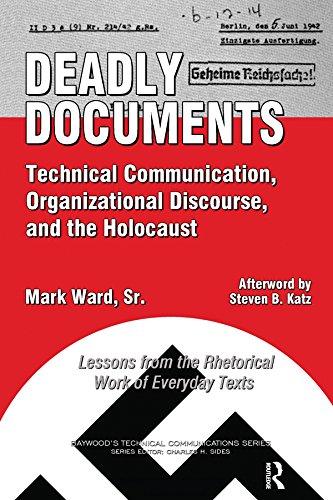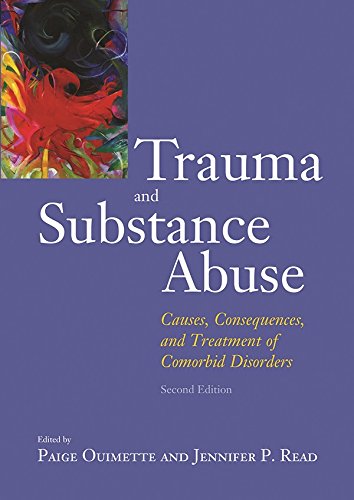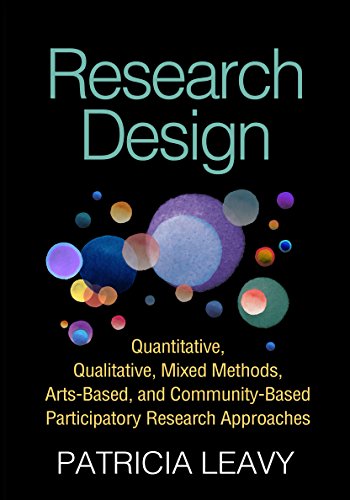
By Mark Ward
Scholars, academics, and practitioners of organizational, expert, and technical verbal exchange and rhetoric are goal audiences for a brand new booklet that reaches throughout these disciplines to discover the dynamics of the Holocaust. greater than a heritage, the ebook makes use of the intense case of the ultimate method to illumine the communicative structure of companies and to damage new floor on harmful organizational verbal exchange and ethics. lethal files: Technical communique, Organizational Discourse, and the Holocaust—Lessons from the Rhetorical paintings of daily Texts begins with a microcosmic examine a unmarried Nazi bureau. via shut rhetorical, visible, and discursive analyses of organizational and technical records produced by means of the SS defense Police Technical concerns Group—the bureau that controlled the Nazi cellular gasoline van program—author Mark Ward indicates how daily texts functioned as “boundary items” on which competing organizational pursuits might venture their very own interpretations and briefly negotiate consensus for his or her components within the ultimate Solution.
The preliminary chapters of lethal files supply a historic ethnography of the SS technical bureau by means of heavily describing the institutional and organizational cultures during which it operated and concerning organizational tales informed in postwar testimony by way of the desk-murderers themselves. Then, via exam of the first fabric in their records, Ward demonstrates how this Social Darwinist international of competing Nazi bureaucrats deployed rhetorical and linguistic assets to build a social fact that normalized genocide. Ward is going past the standard Weberian bureaucratic paradigm and applies to the matter of the Holocaust either the interpretive view that sees organisations as socially built via verbal exchange and the postmodern view that denies the inspiration of a preexisting social item known as an “organization” and as an alternative situates it inside higher discourses.
The concluding chapters hint how modern students verbal exchange have wrestled with the Nazi case and built a consensus clarification that the desk-murderers have been amoral technocrats. even though the reason is disregarded through so much historians, it however bargains, Ward argues, a comforting distance among “us” and “them.” but, as Ward writes, “First, we are going to study extra concerning the dynamic position of daily texts in organizational approaches. moment, as we see those processes—perhaps inherent to all geared up groups, together with our own—at paintings even within the severe case of the SS Technical issues team, the comforting distance that we now continue among ‘them’ and ‘us’ is inevitably decreased. And 3rd, our newfound ache may well open efficient areas to revisit traditional wisdoms concerning the ethics of technical and organizational communication.”
Read or Download Deadly Documents: Technical Communication, Organizational Discourse, and the Holocaust: Lessons from the Rhetorical Work of Everyday Texts (Baywood's Technical Communications) PDF
Similar psychological research books
Techniques of Event History Modeling: New Approaches to by Hans-Peter Blossfeld,G"tz Rohwer PDF
Together with new advancements and courses that have seemed because the ebook of the 1st variation in 1995, this moment version: *gives a entire introductory account of occasion historical past modeling suggestions and their use in utilized learn in economics and the social sciences; *demonstrates that occasion historical past modeling is a tremendous leap forward in causal research.
Download PDF by Paige Ouimette,Jennifer P. Read: Trauma and Substance Abuse, Second Edition: Causes,
During the last decade, study at the epidemiology, nature, and which means of the comorbidity among trauma, PTSD, and substance abuse has burgeoned. alterations within the political and social weather of the U.S. in this time have introduced with them new demanding situations. adjustments within the definitions of either posttraumatic pressure ailment (PTSD) and substance abuse were proposed via these concerned with diagnosing and treating individuals with those matters; a few of these alterations are anticipated to be mirrored in destiny diagnostic platforms.
Now in its 3rd variation, Dennis Howitt’s creation to Qualitative tools in Psychology is healthier than ever. This relied on and precious pupil assets presents transparent causes and examples that take the reader via qualitative examine from info assortment to research. It additionally beneficial properties committed sections supplying information on ethics, caliber and file writing.
Get Research Design: Quantitative, Qualitative, Mixed Methods, PDF
This uncomplicated booklet offers a step by step advisor to utilizing the 5 significant ways to analyze layout: quantitative, qualitative, combined equipment, arts-based, and community-based participatory study. Chapters on every one strategy stick with a different format--they current a template for a examine suggestion and clarify intimately tips on how to conceptualize and fill in each part.
- Kindliche Sprachentwicklungsstörung - Komplexität und Therapie (German Edition)
- Handbook of Developmental Research Methods
- Perspectives On Loss: A Sourcebook (Series in Death, Dying, and Bereavement)
- When All the Friends Have Gone: A Guide for Aftercare Providers (Death, Value and Meaning Series)
Extra info for Deadly Documents: Technical Communication, Organizational Discourse, and the Holocaust: Lessons from the Rhetorical Work of Everyday Texts (Baywood's Technical Communications)
Example text
Deadly Documents: Technical Communication, Organizational Discourse, and the Holocaust: Lessons from the Rhetorical Work of Everyday Texts (Baywood's Technical Communications) by Mark Ward
by Ronald
4.2



